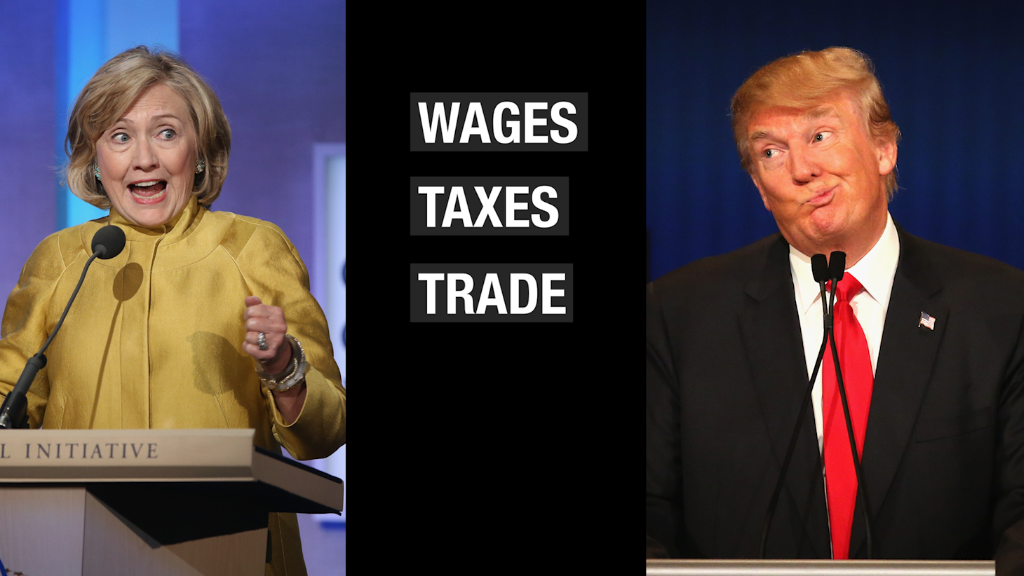
Hillary Clinton has often said she wants the rich to pay their "fair share." Translation: More.
And the bevy of tax proposals she's put forth would significantly raise the tax burden of the country's highest earners.
The top 1% of households -- defined as bringing in more than $730,000 a year -- would see their tax burden go up by more than $78,000 on average, according to an analysis of Clinton's original tax plan from the Tax Policy Center.
All told, they would pay more than three-quarters of her proposed tax increases.
The vast majority of tax filers, meanwhile, would see little change in their after-tax income.
The caveat: The analysis could not account for a yet-to-be-released Clinton proposal to cut taxes for low- and middle-income filers.
Here are some of the key changes she'd like to make, including some proposals she's backed since the first TPC analysis came out:
Raise income taxes on the wealthiest
Clinton's plan would make the tax code even more progressive than it is today.
She would impose the so-called Buffett Rule, requiring those with adjusted gross incomes over $1 million to pay a minimum of 30% of their income in taxes.
On top of that, she would impose a 4% surcharge on adjusted gross income over $5 million.
Related: Donald Trump's big tax cuts come at a big cost
Clinton would also limit the value of certain deductions and exclusions to 28%. That would reduce the benefit of those tax breaks for anyone in tax brackets higher than 28%.
These measures individually and combined would make figuring one's tax liability harder. For instance, filers would need to compare their tax bill under both the regular code and the Alternative Minimum Tax to what they would owe under the Buffett Rule, and pay whichever is highest.
"Tax preparation software makes such calculations manageable, but they would still make the already murky individual income tax even more opaque," the TPC analysis noted.
Raise capital gains taxes on high-income investors
Capital gains are a big source of wealth for very high-income filers -- defined as those making more than $400,000.
Under today's tax code, they pay a 20% tax on realized gains from investments held more than a year. Clinton would preserve that rate, but only for investments held at least six years.
Under her plan, realized gains on investments held less than six years would be taxed on a sliding scale.
Investors would pay the ordinary income tax on investments held less than two years. Currently, that's only the case for investments held less than one year.
The top capital gains tax rate would then fall by about 4 percentage points each year thereafter until it reaches 20% in year six.
On top of the new capital gains tax rates, Clinton would preserve the current 3.8% in Medicare surtaxes that investors owe if their gains exceed a certain threshold.
Make investment fund managers pay more
Clinton wants so-called carried interest to be taxed as ordinary income.
Carried interest is a portion of investment profits paid to managers of hedge funds, venture capital funds, and other private equity funds.
Currently those profits are taxed as capital gains at 20% (or 23.8% if the managers also owe the Medicare surtax). In either case, that is well below the 39.6% top rate individuals pay now on ordinary income.
With the Medicare surtax, investment managers would face a top rate of 43.4% on their carried interest under Clinton's plan.
Increase taxes on big estates, inheritances
Money and assets left to heirs would be taxed more heavily if they come from a big estate.
Clinton would tax estates worth more than $3.5 million ($7 million for married couples.) That's below today's estate tax exemption level of $5.45 million ($10.9 million for couples).
She would also raise the top estate tax rate to 45% from 40%.
In addition, Clinton would tax estates over $10 million at 50%, estates over $50 million at 55% and estates over $500 million at 65%.
She would also eliminate the so-called "step up in basis," which is a big capital gains tax break enjoyed by those who inherit assets.
Clinton may make some exceptions, such as for beneficiaries making less than $250,000, and offer protections to those who inherit non-financial assets such as a business or home.
